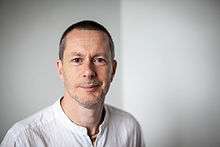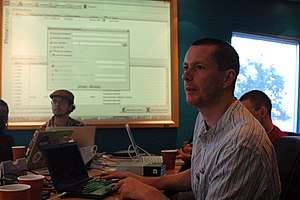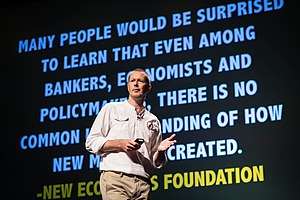Ken Banks
Ken Banks (born 1966) is a British social entrepreneur, author, and consultant in areas covering technology and global development. He is best known for developing FrontlineSMS, a mobile messaging platform.
Ken Banks | |
|---|---|
 Ken Banks at PopTech in 2012 | |
| Born | 1966 |
| Nationality | British |
| Alma mater | University of Sussex (1999) |
| Occupation | Entrepreneur, consultant, book author, mobile technologist[1] |
| Years active | 2002 - present |
| Known for | Social entrepreneurship, mobile technology, global development, FrontlineSMS |
| Title | Founder of kiwanja.net and FrontlineSMS[2] |
| Awards |
|
Early life and education
Banks was born in 1966 in Jersey. He has an older brother and two younger sisters and was raised by his mother, who was an amateur naturalist.[6]
At age 14, Banks developed an interest in computing and learned how to code.[7] He worked on a Commodore PET and developed some early computer-aided-learning programs.[6] Banks attended Hautlieu and Highlands College.[8]
Career
Banks worked at a local bank where he gained experience in commercial computing, working initially on Burroughs B1700 mainframe computers. In 1995, Banks began studying social anthropology and development studies at the University of Sussex, from which he graduated in 1999.[9]
Banks worked at Cable & Wireless plc helping roll out cable television across the UK before the company sold its cable assets to NTL in 2000.
In 2001, Banks worked as a project manager at CERCOPAN, a primate sanctuary in Nigeria, helping rescue and rehabilitate a range of primate species. He suffered a broken leg in a bike accident in Calabar in September 2002 and was forced to return to Jersey to recover. In December 2002, he began working on one of the earliest mobiles for development initiatives with Fauna and Flora International (FFI), a global conservation organisation based in Cambridge, UK.[10] His work resulted in the launch of the wildlive! mobile portal in December 2003,[11][12] which provided images, animal sounds, conservation-themed games, and live news to subscribers.[13]
In 2003, he established kiwanja.net, an NGO focused on applying mobile technology for social and environmental change in the developing world, especially in Africa.[14][15][16] In a special report on the use of mobile phones in development, World Watch Magazine described Banks as "probably the world's leading voice in promoting mobile phones as an appropriate technology".[17]
FrontlineSMS

In 2004, Banks was approached by Kruger National Park (South Africa) officials asking for a solution to update Bushbuckridge community members on changes and developments in the park using their mobile phones.[18][19] After research it turned out that all solutions at the time required Internet access which, back in 2004, was a problem in the area.[13] In early 2005, Banks realized that a simple piece of software could be developed to send and receive multiple text messages (SMS) to and from mobile phones using a laptop with no Internet connection.[20] With an initial investment of 10,000 pounds,[21][13]) Banks started to develop FrontlineSMS in summer 2005 and completed it within 5 weeks.[13] The software was officially launched in October 2005. In 2006, he was invited to Stanford University as a Visiting Fellow on the Reuters Digital Vision Program,[22] mentoring and supporting other social entrepreneurs working on technology-driven social change initiatives.
Almost two years after its launch, FrontlineSMS was used by a Nigerian organization called Humanitarian Emancipation Lead Project (HELP) to assist Nigerians in reporting on their 2007 national elections.[23] The BBC ran a story, Texts monitor Nigerian elections, mentioning FrontlineSMS[24] and user downloads and global interest accelerated. Shortly after, Banks received his first grant from the MacArthur Foundation[25] and stayed in Silicon Valley for an additional year developing the software and teaching at Stanford. Banks later received further funding from the Hewlett Foundation, Open Society Initiative, Rockefeller Foundation and Omidyar Network.[21] In 2009, Banks started a two-year FrontlineSMS Ambassadors Programme with the Clinton Foundation.[26] His work led to several awards including The Tech Awards (2009),[5] The Antonio Pizzigati Prize for Software in the Public Interest (2011)[27] and the Curry Stone Design Prize (2011).[28] His work was recognised through a PopTech Social Innovation Fellowship (September 2008),[29] National Geographic Emerging Explorer (May 2010),[30] Ashoka Fellowship (2010)[31] and Fellow of the Royal Society of Arts (2012).[32][33]
In 2011, Banks was invited to join the UK Prime Minister’s delegation to Africa.[34]
In March 2012, Banks won the Cambridge News Business Excellence Award due to a special "Corporate & Social Responsibility" nomination.[35] Later that year he launched his new startup, Means of Exchange, which focused on using technology to rebuild local communities.[35][36] One of the project’s first initiatives was a "cash mob" during the London Olympics.[37]
In May 2012, Banks announced a management change at FrontlineSMS. Laura Walker Hudson took over the running of The kiwanja Foundation (which later became SIMLab) and Sean McDonald took over the running of FrontlineSMS. Banks took on a new role as Chair of the Board.[38]
After FrontlineSMS

In 2015, Banks became the first entrepreneur in residence at CARE International,[39][40] and took the position of Visiting Fellow at RMIT University (Melbourne).[41]
In 2016, Banks received the ACM Eugene L. Lawler Award for Humanitarian Contributions within Computer Science (2016) for his work with mobile technology and community empowerment.[3] In March 2018, Banks was appointed Visiting Fellow at Cambridge Judge Business School[42] and in April 2018 he closed down his consultancy, kiwanja.net, and took on a full-time role at Yoti as their Head of Social Impact.[43]
Publications
Banks' first edited book, The Rise of the Reluctant Innovator, was self-published in late 2013 and came with a foreword from Archbishop Desmond Tutu.[44] His second book, Social Entrepreneurship and Innovation, was published by Kogan Page and released in March 2016 with forewords by British musician Peter Gabriel and the founder of Ashoka, Bill Drayton.[45]
Awards and fellowships
| Year | Recognition | Recognition type | Awarding body |
|---|---|---|---|
| 2006 | Reuters Digital Vision Program[22] | Fellowship | Stanford University |
| 2008 | PopTech Social Innovation fellow[29] | Fellowship | PopTech network |
| 2009 | The Tech Awards[5] | Laureate | The Tech Museum of Innovation |
| 2010 | National Geographic Emerging Explorer[30] | Fellowship | National Geographic Society |
| 2010 | Ashoka Fellow[31] | Fellowship | Ashoka |
| 2011 | The Antonio Pizzigati Prize for Software in the Public Interest[27] | Award | Tides |
| 2011 | Curry Stone Design Prize[28] | Award | Curry Stone Foundation |
| 2012 | Fellow of the Royal Society of Arts[32] | Fellowship | Royal Society of Arts |
| 2012 | Cambridge News Business Excellence Award[35] | Award | Cambridge News & Cambridge Business magazine |
| 2016 | ACM Eugene L. Lawler Award for Humanitarian Contributions within Computer Science[3] | Award | Association for Computing Machinery |
| 2018 | Visiting Fellow[42] | Fellowship | Cambridge Judge Business School |
References
- Klibanoff, Eleanor (October 27, 2014). "The Red Cross Is Using Text Messaging To Take Down Ebola". NPR. Retrieved January 28, 2019.
- Groeger, Lena (June 15, 2011). "Look Ma, No Internet! Free Software Gives Text-Messaging New Reach". Wired. Archived from the original on December 22, 2016. Retrieved January 28, 2019.
- Jenny Chapman (2017-05-10). "Major award for Cambridge computer luminary". Cambridge News. Archived from the original on 2017-11-20. Retrieved 2017-11-20.
- Lloyd Alter (2011-10-04). "2011 Curry Stone Design Prize Winners Announced". TreeHugger. Archived from the original on 2015-09-08. Retrieved 2017-11-20.
- Tom Foremski (2009-11-19). "Rewarding tech that benefits humanity". ZDNet. Archived from the original on 2017-11-20. Retrieved 2017-11-20.
- "Inventor and Social Anthropologist: Ken Banks". National Geographic Society. 2011-01-21. Archived from the original on 2017-11-26. Retrieved 2017-11-26.
- Ken Banks (2014-06-01). "Trubute to a friend". kiwanja.net. Archived from the original on 2014-06-12. Retrieved 2017-11-26.
- "Jerseyman joins UK mission". Jersey Evening Post. 2011-07-26. Archived from the original on 2017-11-26. Retrieved 2017-11-26.
- "Ken Banks, BA in Social Anthropology and International Development (1999) talks about his career". University of Sussex. 2018. Archived from the original on December 18, 2018. Retrieved December 18, 2018.
- Imani M. Cheers (2013-02-25). "Changing the World, One SMS at a Time". International Reporting Project. Archived from the original on 2013-12-03. Retrieved 2017-12-03.
- "Mobile boost for conservationists". 2003-12-12. Retrieved 2019-03-11.
- Ken Banks (2010-12-13). "Reflections on eight years in mobile". kiwanja.net. Archived from the original on 2017-08-26. Retrieved 2017-12-03.
- David Maxwell Braun (2010-09-29). "Solving eco challenges with grassroots messaging". National Geographic Society. Archived from the original on 2017-12-03. Retrieved 2017-12-03.
- "The meek shall inherit the web". The Economist. September 4, 2008. Archived from the original on December 18, 2018. Retrieved December 18, 2018.
- Lule, Jack (2012). "Introduction: Global Village of Babel". Globalization and Media: Global Village of Babel. Rowman & Littlefield. p. 12. ISBN 978-0-7425-6836-5 – via Google Books.
- Joyce, Mary C. (2010). Digital Activism Decoded: The New Mechanics of Change (PDF). International Debate Education Association. p. 69. ISBN 978-1-932716-60-3.
- Mulrow, John (2010-05-22). "Think Mobile, Act Local" (PDF). World Watch. Vol. 23. p. 27. Retrieved 2019-03-22.
- Burbank, April (June 20, 2012). "How Ken Banks Built a Startup One Text Message at a Time". Forbes. Retrieved January 28, 2019.
- Davies, Nicola (June 12, 2015). "Keeping it simple: The next technology revolution". ExtremeTech. Retrieved January 28, 2019.
- Wolber, David; Abelson, Hal; Looney, Liz; Spertus, Ellen (2014). "11: Broadcast Hub". App Inventor 2 (PDF) (2nd ed.). O'Reilly Media. p. 186. ISBN 9781491906842.
- Livingston, Steven, ed. (2014). "FrontlineSMS:Grassroots M4D Innovation and the Challenges of Success". Bits and Atoms: Information and Communication Technology in Areas of Limited Statehood. Oxford University Press. pp. 84–85. ISBN 978-0-19-994159-9. Retrieved 2017-12-07 – via Google Books.
- "Making the message count" (PDF). Falmer. No. 46. University of Sussex. 2007. p. 17. Archived from the original (PDF) on 2017-12-07. Retrieved 2017-12-07.
- Stuart Thornton (2011-01-21). "Spreading the Message". National Geographic Society. Archived from the original on 2017-12-07. Retrieved 2017-12-07.
- "Texts monitor Nigerian elections". BBC. 2007-04-20. Archived from the original on 2017-12-07. Retrieved 2017-12-07.
- "Stanford University - MacArthur Foundation". www.macfound.org. Retrieved 2019-03-11.
- "FrontlineSMS Ambassadors Programme". Clinton Foundation. Archived from the original on 2016-11-10. Retrieved 2017-12-12.
- "Pizzigati Prize: Support the Winners". tides.org. Archived from the original on 2017-12-07. Retrieved 2017-12-07.
- "Can text messages start a grassroots movement?". Curry Stone Design Prize. Archived from the original on 2017-12-07. Retrieved 2017-12-07.
- "NEWS: kiwanja.net awarded 2008 Pop!Tech Fellowship". FrontlineSMS. 2008-09-16. Archived from the original on 2017-12-09. Retrieved 2017-12-09.
- "Emerging Explorer Ken Banks". National Geographic Society. Retrieved 2017-12-09.
- "Ken Banks". Ashoka (non-profit organization). Archived from the original on 2017-12-09. Retrieved 2017-12-09.
- "In your network: Ken Banks". Royal Society of Arts. Archived from the original on 2017-12-09. Retrieved 2017-12-09.
- Dominguez, Alex (July 25, 2012). "National Geographic grows mission with chef fellow". Associated Press. Retrieved December 6, 2018 – via The San Diego Union-Tribune.
- Jim Pickard (2011-07-18). "David Cameron heads for South Africa with Bob Diamond and business delegation". Financial Times. Archived from the original on 2017-12-10. Retrieved 2017-12-10.
- Scialom, Mike (2012). "A new era for Banks" (PDF). Cambridge Business (November/December). Archived from the original (PDF) on 2017-08-26. Retrieved 2017-12-10.
- Kathryn Cave (2015-01-15). "Ken Banks interview: Technology for social good". IDG Connect. Archived from the original on 2015-08-06. Retrieved 2017-12-10.
- Monty Munford (2012-08-15). "Cash Mobs: how the internet can revive local shops". The Daily Telegraph. Archived from the original on 2017-12-10. Retrieved 2017-12-10.
- Ken Banks (2012-05-29). "A transition announcement from our Founder, Ken Banks". FrontlineSMS. Archived from the original on 2017-12-09. Retrieved 2017-12-09.
- "Embracing innovation with our new Entrepreneur in Residence". CARE International UK. 2015-11-12. Archived from the original on 2017-12-10. Retrieved 2017-12-10.
- Rob Goodier (2016-05-12). "Five Questions with Ken Banks: ICT4D Writer, Editor and FrontlineSMS Founder". Engineering for Change. Archived from the original on 2016-08-11. Retrieved 2017-12-10.
- "Business Research Showcase 2015 highlights". RMIT University. 2016-11-13. Archived from the original on 2015-11-27. Retrieved 2017-12-10.
- "Identity matters". CJBS Insight. 2018-10-22. Retrieved 2019-03-10.
- "In the Spotlight with Ken, Head of Social Impact at Yoti". Yoti Blog. 2018-04-17. Retrieved 2019-03-10.
- Parkinson-Hardman, Linda (2015-02-12). "Meet Ken Banks, author of The Rise of the Reluctant Innovator". Woman on the edge of reality. Retrieved 2019-03-22.
- Banks, Ken (2016). "Social entrepreneurship and innovation international case studies and practice". Kogan Page. OCLC 949230393. Retrieved 2019-03-22.